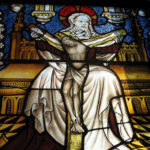We run our website the way we wished the whole internet worked: we provide high quality original content with no ads. We are funded solely by your direct support. Please consider supporting this project.

A Brief Theology of the Trinity
“The economic Trinity is the immanent Trinity, and the immanent Trinity is the economic Trinity.” This is the maxim introduced by the Catholic theologian Karl Rahner that should shape our discussion of the Trinity. It is simply a short-hand way of saying that since the way God is toward us in Christ truly reveals God, then there must be, at the very least, a strong analogical correspondence between who God is eternally (the immanent Trinity) and who God has revealed himself to be in Christ (the economic Trinity). Yet, if the immanent/economic distinction is to be retained, this correspondence cannot be a strict identity. There are contingent aspects of God’s revelation toward us—aspects such as God-becoming-human and God-becoming-sin—that we must consider to be absent in the way God exists within his threefold self prior to and apart from creation.
While a great deal could be said about the Trinity, I want to focus on the aspect of God’s revelation in Christ that must be affirmed if we are to understand the character of his eternal threefold identity. That is, while there is obviously no Incarnation or Crucifixion within the immanent Trinity prior to creation, we must affirm that the infinitely intense love of God that is expressed by the economic Trinity via God stooping an infinite distance to become what is antithetical to himself on Calvary expresses the unsurpassable intensity of the unwavering perfect love that the three divine Persons have for each other throughout eternity.
Moreover, inasmuch as the Church as the bride of Christ is a contingent expression of the Father’s perfect love for the Son that is mediated by the Spirit, and inasmuch as the bride, abiding in the Son, shares in the Son’s reception of the Father’s perfect love and participates in the Son’s perfect love for the Father mediated through the Spirit, we must go further and add that God’s revelation to us —which is synonymous with God’s salvation of us—expresses the perfect eternal love that unites the triune fellowship throughout eternity.
The best expression in Church history of the infinitely intense triune love that is revealed on the cross and that characterizes who God is eternally, in my estimation, is found in the Cappadocian concept of the perichoresis of the three Persons. In essence, this concept stipulates that the other-oriented love of the three divine Persons is such that throughout eternity they have completely given themselves over to one another and thus fully dwell within one another. I contend that the Church is graciously made a participant of this infinitely intense, triune, mutually-indwelling love that is incarnated and revealed in Christ.
I also contend that it is the perfect, eternal, other-oriented love of the triune community that comprises the true sense in which God is “immutable” and “impassible.” For whatever God experiences as he interacts with creatures in the course of history—however he is impacted or whatever plans get changed—this love is never improved, diminished, nor threatened. For this love is who God is. It is why we can trust that God is the same within himself as he is toward us, and why we can trust that the way he reveals himself to be in Christ is the way he’s always been. Moreover, it’s why we can trust that, while particular plans of God may fail inasmuch as they depend on the cooperation of free agents, the unconditional promise he has made in Christ to have a corporate body (the Church) who will co-rule with him in a redeemed creation that has been freed from all evil cannot fail.
The triune God is the Father, Son and Spirit who eternally give themselves to one another in love, which is most fully expressed in the self-giving of Christ on the cross. And now we, as a part of the bride of Christ, are invited to share in the love the Father has for the Son and to participate in the Son’s perfect love for the Father by the power of the Spirit.
Photo credit: Thomas Hawk via Visual hunt / CC BY-NC
Category: General
Tags: God, God is Love, Jesus, The Holy Spirit, Trinity
Topics: Trinity
Related Reading

Lighten Up: The Jesus Eraser
“For he himself is our peace, who has made the two groups one and has destroyed the barrier, the dividing wall of hostility…” Ephesians 2:14 Image by David Hayward @ www.nakedpastor.com.

Kingdom Sightings: God and Guinness
Evan Leeson via Compfight Here’s a unique Kingdom initiative from one of our readers that we wanted to share with you. If you’re in Ann Arbor, check it out! Starting in January, one of the pastors at our church (Kevin Davis, of 242 Community Church in Ann Arbor, MI) will be starting a new initiative…

The Risk of Love
The most basic and yet most profound teaching of the Bible is that “God is love” (1 Jn 4:8; 16). He is revealed to be a God who is triune—Father, Son and Holy Spirit (See Mt 3:16; 28:19, Jn 14:26; 15:26)—who’s very essence is an eternal, loving relationship. He created the world out of love…

Did the Father Suffer on the Cross?
When I argue that the cross is a Trinitarian event (See post), some may suspect that I am espousing Patripassionism, which was a second and third century teaching that held that God the Father suffered on the cross. While this view was often expressed as a form of heretical Modalism, and while the Patristic fathers…

Is speaking in tongues the initial evidence of receiving the baptism of the Holy Spirit?
Pentecostals have traditionally taught that speaking in tongues is evidence that a person is filled with the Holy Spirit. Those who defend this position do so primarily on the basis of a pattern they discern in Acts. They note that when the disciples were first baptized in the Spirit on the day of Pentecost, “all…
